Recent Recordings by Area Musicians
The plague continues to impact the music scene, depriving artists of performance and recording opportunities. This month, we take a look at the most recent releases by one local band and several albums by musicians associated with the SEMJA area who have now settled in other places.
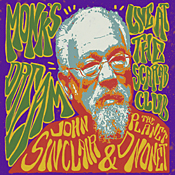
The Planet D Nonet, aka PD9, under the direction of James O’Donnell and RJ Spangler have been exploding the jazz tradition for years, from the Kansas City roots of swing to the outer space travels of Sun Ra. On their latest recording they turn to the singular works of Thelonious Monk. Monk’s Dream: John Sinclair & Planet D Nonet is a postcard from a night at the venerable Scarab Club in Detroit in October of 2017 that was only released last month, played by Justin Jozwiak, alto sax, Jim Holden, tenor sax, Goode Wyche III, baritone & alto saxes, James O’Donnell, trumpet, co-leader, Allen Dennard, trumpet, Tbone Paxton, trombone, Michael Zaporski, piano, Shannon Wade, bass, Sean Perlmutter, drums, and RJ Spangler, congas, percussion, leader, concert co-producer.
The tunes chosen for release begin with “Jackie-ing,” moving right away after the head into a bravura baritone sax solo by Goode Wynche III, followed by a short but savory trumpet solo, most likely by Allen Dennard, and then with a piano outing by Michael Zaporski. The tempo is relaxed and loping, underscored by Spangler’s lovely conga. The rhythmic vibe is very un-Monkish, but it works! After a loving “Crepuscule with Nellie,” arranged, as was the previous tune, by Scott Gwinnell, the band brings up poet, bluesnik, band manager, political activist, and radio personality John Sinclair to indulge in his singular brand of jazz poetry. Backed by what seems to be a head arrangement by PD9, Sinclair launches into an atmospheric “Round About Midnight,” taking us back into the forties of the last century, to the time Monk was working in Cootie Williams’s band, imagining the composing of the classic and the late-night atmosphere of the smoky night clubs of the time in a definitely noire manner. Sinclair’s smoky baritone is perfect for this. “Monk’s Dream” follows, and the poetry takes us to the east side of Detroit to the burnt out house on Heidelberg Street, but “An Oscar for Treadwell,” originally recorder in 1949 by Charlie Parker with Monk on piano, takes us back into Sinclair’s well-informed jive on jazz history, visiting the late-night joints where bebop was crafted, such as Clark Monroe’s Uptown House in Harlem, where the house band, which often featured Parker, included trumpeter Oscar Treadwell.
Irresistible!
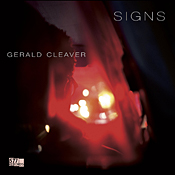
Moving on to the diaspora, we first turn to drummer, electronics wizard, composer, and bandleader Gerald Cleaver, who has been featured on a plethora of recordings of late and we can only cover a few of them here. The first is unexpected, but not to unsurprising to many SEMJA readers. Harkening back to his Motor City upbringing he has just released a solo album entitled Signs.
There are no drums here, only electronics, inspired by the Detroit techno and electronic music scene, and true to its roots it is available in a limited run of 100 LPs but can also be downloaded or heard on such streaming services such as Spotify. This is not hard-driving dance music, but imaginative sound painting with subtle grooves and the kind of line variation one would expect from someone normally working in various jazz idioms. Even for those not versed in techno like me there is much to enjoy here. Each tune is different in electronic patterns, emotional implications, development, and rhythms, with layering of sound that brings many listening surprises. Some are abstract poems filled with layered sounds and textures, others are more linear, sometimes even approaching keyboard improvisations. What makes this recital singular is an unexpected reserve, tinged with lyricism.
A lovely surprise!
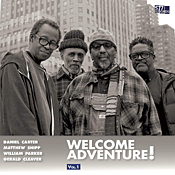
The electronics recital contrasts nicely with something completely different: Welcome Adventure! Vol. 1, a collaborative effort by four master musicians who are often encountered leading their own groups: Daniel Carter, on tenor sax, trumpet, flute, pianist Matthew Shipp, William Parker on bass, and Cleaver on drums. This is adventurous post-bop music that is highly informed by the modern jazz tradition.
On the opening tune, “Majestic Travel Agency,” the rhythms start off jagged, only to move towards a groove, leading to Carter’s tenor entry, with piano laying out and Parker setting up one of his repetitive riffs while Cleaver dances around leading to more intense explorations as the piano moves in as well. The music stays in groove, but the rhythms are broken down and then restored on a more sedate manner, with end of tempo with only bass and sax remaining. The second track, “Scintillate,” begins more dramatically with Carter on trumpet and the vibe seems to reference pre-electric Miles in a pensive mood, with Shipp surprisingly Hancock-like, and the horn dancing over shifting patterns that suggest a two over three beat. The album ends with a similar mood but more exploratory texture, as Carter switches once again, this time back to flute, played over out of strict tempo improvisation by the other three, who create a dense fabric of shifting sounds. This is the longest track, and it eventually leads into a loping swing with Cleaver laying down various imaginative patterns, as Parker provides his immediately recognizable deep sounding, earthy, spare riffs mixed with old-fashioned bluesy walking bass. The music keeps shifting in and out of tempo and Carter switches still again back to trumpet, all ending with clashing dark piano chords and an ominous stormy statement—no pretty, quiet smiling nod to the future here.
This is surprisingly traditional music, given who is on the recording, but there is no imitation here nor any revivalist spirit, only a reimagined homage to certain moments in the history of the music. But even though it was recorded at the end of October of 2019, there is a melancholy flavor here that is almost prescient, given what was to come.

When the plague did arrive, Cleaver also took part in a series of recordings organized by tenor saxophonist Stephen Gauci under the collective marker Pandemic Duets. Gauci is a saxophonist of great sonic resourcefulness and powerful sound who is also a tireless organizer of performance opportunities, and so when everything shut down in New York in March and all musical opportunities disappeared, rather than fall into despair “I resolved to safely record a series of duet recordings in order to fully express musically, the intense emotions we are all feeling during this challenging period. What was originally meant to be a string of five duet recordings, eventually turned into a series of nineteen recordings over the course of summer 2020.” One of these is a magnificent set in tandem with Cleaver (gaucimusic.bandcamp.com/album/gerald-cleaver-stephen-gauci-pandemic-duets).
On three fully improvised tracks the two provide ample proof of the wide range of artistic resources both musicians have acquired over the years. This kind of duo playing requires deep listening on the part of both musicians and an ability to inspire listeners in an unadorned context, where the two cannot rely on other participants to create variety or rekindle lagging inspiration. I must admit that I am very much taken by Gauci’s tenor playing and, in these duets he is at his finest, creating long passages of integrated patterns, sound textures, and melodies, using the full range of his horn, with a particular penchant for exploiting contrasting sounds and very wide intervals, with passages in the very highest registers of the tenor interspaced with blasts from the very depths of the horn, suddenly moving into lyrical mid-range passages. Cleaver is, as always, the perfect mate in this conversation, creating ever-shifting dense percussion patterns that remind us once again of his sonic and rhythmic inventiveness as he also brings his composer chops to the proceeding, helping to create completely free improvisations that move as if premediated by some unseen outside creator.
Starting with this recording we move on to a series of drum/reed duets that collectively demonstrate the kind of heterogenous inventiveness that such a stripped down instrumentation can offer when in the right hands.
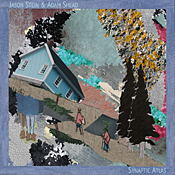
The second duo album with similar instrumentation is Synaptic Atlas, featuring two expatriates who attended the University of Michigan School of Music Theater and Dance and now live in Chicago: bass clarinetist Jason Stein and drummer/percussionist Adam Shead. Stein is the older and better known of the two, but Shead has also established himself as an important player in the Windy City improv scene both as a performer and session organizer who ran the Slate Arts venue that provided exploratory improvisers a place to play until the virus put an end to all such places. The two have been performing in duo for some time and the tracks on this album were recorded during two such gigs and was released in October of this year.
The seven improvisations chosen for release are relatively short, ranging from just over two to eight minutes, with one going for twelve (characteristically entitled “Endurance”). By keeping their tunes short the duo enforces artistic discipline: Stein and Shead are both patient and determined improvisers who like to build up tension and momentum towards a climax, working in an interactive manner in which every little change in direction seems telepathically shared. Stein reveals his most avant side that is to some while Shead interacts with him in a manner that can best be described as orchestral, privileging timbral variety, ever-changing patterns, and melodic movement over keeping strict pulse as is so often required of drummers, even if he can break into this when the music moves there. While he music can be highly emotional at times, it never sinks into the cliché scream that so often serves to paper over lack of technique and inspiration. Both Stein and Shead exhibit the kind of instrumental and artistic mastery that allows them to let the music simply be, to paraphrase Isadora Duncan.
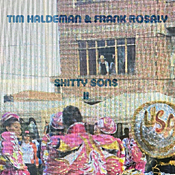
A very different Chicago-related duo recording comes our way from drummer Frank Rosaly and tenor saxophonist Tim Haldeman, their second collaboration entitled Shitty Sons II. Rosaly, originally from Puerto Rico, spent many years in Chicago before moving to Amsterdam five years ago, and Halderman spent some time studying and playing music in Chicago before returning to Ann Arbor. They met when both were in the Windy City and have collaborated on and off ever since.
Rosaly is a time-keeper percussionist and Haldeman is a modernist saxophonist whose interests cover a wide range of modern jazz but are anchored in harmony and melody, clearly rooted in diverse tenor masters such as Sonny Rollins and Clifford Jordan, but who has also learned from Ornette Coleman and other more adventurous players. He has integrated these influences into a personal style with a rich sonorous saxophone sound that is perfectly attuned to his highly emotional playing. Here, he is free to investigate various timbres, melodic patterns, and extended techniques that he often eschews in traditional public group playing, but he remains anchored to harmony and melody. He can whisper or scream as the music requires, and when Rosaly lays out completely he is free to revel in sheer sound. The drummer, who also plays various folk and toy instruments, combines dancing rhythms with melodic sophistication, and when the music really heats up, as on the penultimate “Capillary Trance,” the combined drive of the duo is simply mesmerizing. Rosaly combines a laid-back island drive with big city intensity, ever attentive to the requirements of the duo, and both musicians keep coming up with musical surprises that maintain our attention.
I keep repeating the same word, but there is no avoiding it: the minimalist setting allows us to become enveloped in the kind of aged bourbon sound that takes decades to develop and is usually encountered when listening to tenor saxophonists decades older. This is a recording that requires repeated attention.